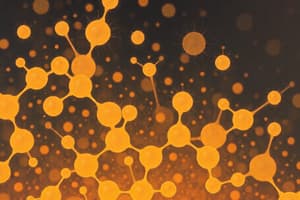Podcast
Questions and Answers
Which of the following elements must be present in all biochemicals?
Which of the following elements must be present in all biochemicals?
- Carbon and hydrogen (correct)
- Carbon and oxygen
- Hydrogen and nitrogen
- Oxygen and nitrogen
Why are water and carbon dioxide categorized as inorganic?
Why are water and carbon dioxide categorized as inorganic?
- Carbon dioxide lacks hydrogen and oxygen
- Water lacks carbon and hydrogen (correct)
- Carbon dioxide lacks carbon and hydrogen
- Water lacks carbon and oxygen
What are the building blocks of complex compounds like carbohydrates, lipids, proteins, and nucleic acids?
What are the building blocks of complex compounds like carbohydrates, lipids, proteins, and nucleic acids?
- Macromolecules
- Monomers (correct)
- Polymers
- Carbohydrates
What are the long term energy resources for humans?
What are the long term energy resources for humans?
What are the main components of lipids?
What are the main components of lipids?
What is the difference between saturated and unsaturated fats?
What is the difference between saturated and unsaturated fats?
What determines the function of a protein?
What determines the function of a protein?
What are enzymes also called?
What are enzymes also called?
What is the effect of high temperature on enzymes?
What is the effect of high temperature on enzymes?
How can organic compounds be combined?
How can organic compounds be combined?
What are the main components of carbohydrates?
What are the main components of carbohydrates?
Flashcards are hidden until you start studying
Study Notes
Biochemicals
- Carbon, hydrogen, oxygen, and nitrogen are essential elements present in all biochemicals.
Classification of Compounds
- Water and carbon dioxide are categorized as inorganic compounds because they do not contain carbon-hydrogen bonds.
Building Blocks of Complex Compounds
- Monosaccharides, fatty acids, amino acids, and nucleotides are the building blocks of carbohydrates, lipids, proteins, and nucleic acids, respectively.
Energy Resources
- Fossil fuels, such as coal, oil, and natural gas, are the long-term energy resources for humans.
Lipid Structure
- The main components of lipids are glycerol and fatty acids.
Fatty Acids
- Saturated fats have single bonds between carbon atoms, while unsaturated fats have one or more double bonds between carbon atoms.
Protein Function
- The function of a protein is determined by its specific shape and chemical properties.
Enzymes
- Enzymes are also called biological catalysts.
Temperature Effects on Enzymes
- High temperatures can denature enzymes, leading to a loss of their biological function.
Combining Organic Compounds
- Organic compounds can be combined through condensation reactions, which involve the loss of a water molecule.
Carbohydrate Structure
- The main components of carbohydrates are carbon, hydrogen, and oxygen atoms, typically in a ratio of 1:2:1.
Studying That Suits You
Use AI to generate personalized quizzes and flashcards to suit your learning preferences.



